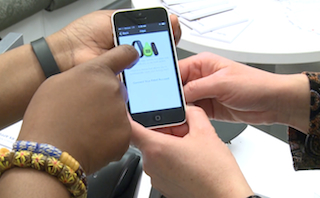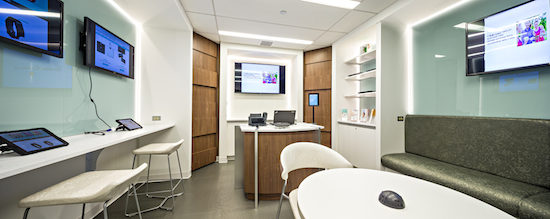 Toward the end of last year, Morristown Medical Center, a part of the Atlantic Health System in New Jersey, opened up HealtheConnect, an on-site, physical store located just off the hospital's main lobby where patients, family members, and medical professionals can learn about health apps and wearable devices. While the store is currently backed by the hospital's foundation, the longterm plan is to transition it into a business and revenue stream in its own right -- in about a year's time.
Toward the end of last year, Morristown Medical Center, a part of the Atlantic Health System in New Jersey, opened up HealtheConnect, an on-site, physical store located just off the hospital's main lobby where patients, family members, and medical professionals can learn about health apps and wearable devices. While the store is currently backed by the hospital's foundation, the longterm plan is to transition it into a business and revenue stream in its own right -- in about a year's time.
Health app curation and recommendation technology from Happtique, the New York City-based company that was recently acquired by SocialWellth, is helping to power the hospital's upcoming HealtheConnect online store. That white-labeled app store will feature curated offerings picked by Happtique as well as clinicians at Morristown, Morristown's President Dr. David Shulkin told MobiHealthNews in an interview.
"Even though I am the CEO of the hospital, I am still a physician with an active practice in internal medicine. One of the things I was seeing with my patients was they were coming to me and asking me what apps would I recommend they use," Shulkin explained.
Patients have asked Shulkin for his take on the recent spate of wearable health device launches and how he might be able to integrate some of the data from these health apps into his practice, too.
"Whenever I think patients are coming in with questions or information about their health that I can't answer, or my doctors can't answer, I think we have an obligation to be part of that dialogue, to learn along with them, and to be there as a resource for them," he said. "Throughout my career, whenever I've seen the healthcare industry act paternalistically and like they know better than patients, the healthcare professional has been left behind. The example that I use is integrated medicine where patients, many years ago, were coming to us and asking us how to use herbs and different types of supplements and how to deal with some of their chronic problems with some of these non-Western or non-traditional therapies. By and large the medical profession ignored it -- and that didn't stop it."
Shulkin said that like integrated medicine, digital health and the rise of health consumerism will be fundamental change agents for the practice of healthcare. That's why his facility, while taking a few cues from Apple Stores' Genius Bars, created a store of its own.
"We wanted to be out in front of that, and that's why we launched this on-site store, so that we would have a place to really encourage the dialogue between patients, family members, doctors, nurses, and other specialists. This is so that we can not only bring valued and trusted information to our patients, but also so that we can learn what our patients are learning in parallel and not in isolation," he said.
Shulkin asked two dozen of his physician leaders -- one in each of the facility's clinical areas -- to go to the AppStore and review patient-facing health apps relevant to their area of expertise. He suggested they look for themselves and seek out resources to find the most popular apps for patients.
"When I did that -- and this was 24 clinical leaders -- only one of them had ever been on the AppStore to look at apps," Shulkin said. "Twenty-three of the 24 had never done it before. The reaction of the doctors after they had looked at the store was pretty consistent. They were amazed at the information that was out there and of the quality of the information that was out there. Many of them, not all of them, then became believers and started talking to their own patients and the faculty in their departments about the quality of the apps that they saw... It really is part of the process because now they are personally involved, and it makes it much more likely that they are willing to have the conversation with others since they've taken the time to look at this stuff."
 Credit: Morristown Medical Center
Credit: Morristown Medical Center
Physicians at Morristown can now use a special mobile app prescription pad that patients can take down to the HealtheConnect store. Once there a member of Morristown's health IT team will walk the patient through how to install and use the app. The store also sells a number of smartphone-connected medical devices, like connected weight scales and blood pressure cuffs from Withings as well as an activity tracker from Fitbit.
If the recommended apps aren't free, patients pay for them as they normally would out of pocket and through their iTunes account. Morristown does not currently have any specific agreements with wearable device makers, it's just buying them at retail and selling them at cost right now. Anyone can visit the store and purchase a device, Shulkin said, they don't need a "prescription" from one of the physicians.
"Let's say you come in through the emergency room with shortness of breath and you are diagnosed with congestive heart failure, which is a new diagnosis for you," Shulkin explained. "So you are highly motivated to learn how to manage congestive heart failure. While you are in the hospital your family members may stop in the HealtheConnect store and actually learn about what technology can offer in the management of congestive heart failure. That may include a couple of apps that we think are credible sources of information about how to manage congestive heart failure. It may involve getting a Bluetooth scale that takes your weight and downloads it into your device and sent onto a nurse or a physician who may be following you. It may also include getting a wearable so that you can monitor some of your physiological [signs]."
Shulkin said with close to 50,000 admissions a year, his facility has significant foot traffic. He estimates hundreds of thousands of people will walk through the lobby over the course of the next year, making it a prime location for educating patients and in-house medical professionals alike about digital health technologies.
"It is a natural tendency of healthcare professionals to not want to be disrupted and not want to change the way that they work," Shulkin said. "It's human nature to say, 'Look, I've been seeing patients without this technology, without having them bring their phones into the exam room, I think that's not a bad way to continue to practice.' But this disruption, the issue of technology, the issue of consumerism, is an external force being imposed upon healthcare. What I'm trying to do with this store is to [show that we] shouldn't fight this external force. We should embrace it and be a part of it, because this is not going away. And, actually, this will improve healthcare outcomes and value in healthcare. Like any change initiative, there are those that embrace early adoption, those that have an open mind to it, and those who are resistors. We have all three. We certainly have a lot of people working in healthcare today who say they have no need for this... and then we have others who think this is really great because now they have somewhere to send their patients when they get these kinds of questions."
Morristown created a physical store because Shulkin believes this kind of behavior change will require people to spend some time getting familiar with the health technology offerings out in the market today, before they will really start recommending or using them.
"This is why we did a physical store: because so much information right now is electronic. So many people spend milliseconds looking at digital messages but not really spending the time to sit down and really see what's going on," he said. "When you have a physical store you have to pause. You have some human interaction, you get to touch and feel things."
















